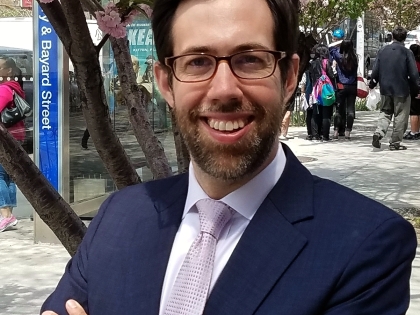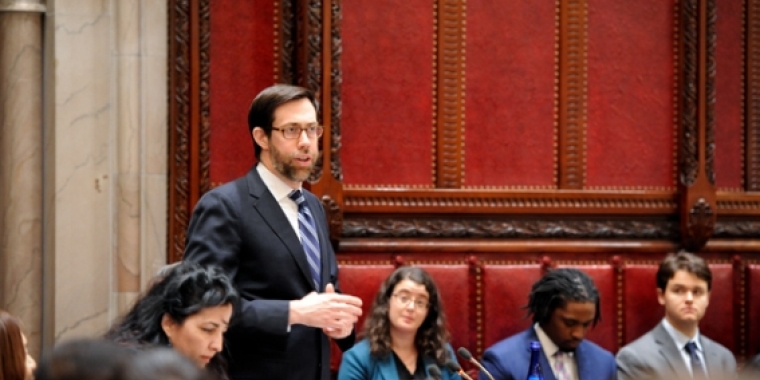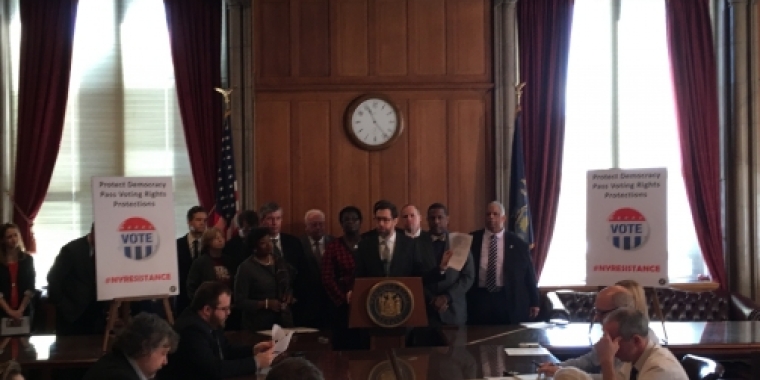
Bill says owners can take 1 unit, not whole building
Feature article in The Villager
By Lincoln Anderson
bill to end so-called “mass evictions” — employed to empty entire buildings, allegedly for landlords’ personal use — failed to come up for a vote in a special session of the state Senate last week. A disappointed Daniel Squadron, the bill’s prime sponsor, said he’ll keep pushing the legislation, and that it definitely will come to the floor for a vote, at the latest, early next year — if not sooner, hopefully, in another special session.
The bill would restrict owner-occupancy evictions to a single dwelling unit, to be used as the landlord’s primary residence. Under what Squadron and the bill’s supporters call a “loophole” in the current law, landlords are allowed to take “one or more” apartments for their personal use — basically giving them carte blanche to empty their buildings completely of tenants.
If passed, Squadron’s bill would prohibit the mass eviction of tenants at 19-21 Barrow St., many of whom have lived in their apartments more than 20 years. The pending legislation comes too late, however, to help the former tenants of 47 E. Third St., who tried to stave off a mass-eviction effort in a court battle, only to concede defeat and take buyouts, with the last of them vacating at the end of last month.
The bill was not called up by the state Senate’s leadership, Squadron said, “because we were missing one vote. But even with that vote, there was no guarantee every Democrat would have voted for the bill.” However, he added, “I don’t believe that bills need to have guaranteed passage to be called up for a vote.”
On Jan. 1, a key reform measure Squadron fought hard for, under which a majority of the Senate’s members can bring up a bill for a vote, will go into effect.
“I got the Senate to make that change,” Squadron said. “It’s a fundamental reform. ... One reason we need to vote is so people can show they’re on the side of tenants,” he said of the importance of having legislators weigh in on the owner-occupancy bill.
Squadron said the mass-eviction law must be reformed as soon as possible.
“This is a loophole that allows multimillion-dollar ‘McMansions’ at cut rates on the backs of affordable-housing tenants,” he said.
Whether landlords actually live in the buildings for the required three years after evicting the tenants is irrelevant, the freshman senator said.
“In either case, it’s a loophole that’s unfair, irrational and threatens our affordable-housing stock,” he stated.
“This is a common-sense update to the law that will assure that tenants don’t have to live in fear,” Squadron continued. “[We have] to close the loophole that allows landlords to evict a whole building at once.”
The Assembly has already passed a version of the bill, sponsored by Vito Lopez.
To ratchet up support for a vote on the bill’s state Senate version, Squadron rallied with rent-regulated tenants from 19-21 Barrow St. last Wednesday outside their building, along with former tenants from 47 E. Third St. Joining them were state Senator Tom Duane and Assemblymembers Deborah Glick and Brian Kavanagh.
David Abramowitz, a 72-year-old tenant of 19-21 Barrow St., said of the bill, “This would be a win for all rent-stabilized tenants, and especially senior citizens. I have lived in my apartment since 1975 and I like it here. It would be very difficult to move at my age.”
Manhattan Borough President Scott Stringer said, “I applaud Senator Squadron for introducing this bill in the state Senate. When my office submitted an amicus [‘friend of the court’] brief to the Court of Appeals in 2007 supporting the rights of the tenants of 47 E. Third St., I was appalled by the notion that a landlord can evict all rent-stabilized and -controlled tenants to use the building for his or her own personal benefit. Government must use all of the tools available to protect tenants from building owners with unscrupulous intentions.”
Kavanagh is a prime sponsor of the bill in the Assembly.
“There are many loopholes that weaken our laws protecting tenants, but the one that allows so-called personal-use evictions is among the most egregious,” Kavanagh stated. “Current law not only allows this pernicious practice, but in some ways encourages it. It’s high time we end it.”
City Council Speaker Christine Quinn said, “The ongoing attempt to displace tenants at 19 Barrow St. seems a clear example of the ways unscrupulous landlords abuse the owner-occupancy provision for personal gain. ... My colleagues and I have informed the Rudd Realty Management Corporation of their legal obligations, and we will continue to work with residents to monitor the situation and pursue legal action if necessary.”
Added City Councilmember Rosie Mendez, “For years, about a dozen of my neighbors at 47 E. Third St. fought to stay in their homes after their landlord claimed he needed the entire tenement building for his family of three. My neighbors lost their homes and were displaced because of the judges’ interpretation of the current law. Something is wrong with the law when you can evict many families to make room for one. Could 100 families be evicted? We need this legislation now to stop mass, owner-occupancy evictions.”
But speaking three weeks ago, as the last of the tenants were vacating his building at 47 E. Third St., Alistair Economakis said he and his family will live there for many years.
Economakis was using a duplex on the building’s fourth and fifth floors for an office and guest bedroom, but moved his belongings out of it at the end of last month, in preparation for the building’s renovation, which is starting from the top and working downward. He, his wife and their three young children, including a new baby, will live in a triplex — made of four interconnected apartments on the first, second and third floors — during the renovation, provided they can stand the dust and construction, he said.
“We’ve lived here [in the building] for two years,” Economakis told The Villager in a telephone interview. “We like the neighborhood. We like the community. ... In a year’s time — or whenever the renovation’s done — that will be the story,” Economakis said.
“I always said it, I’ll guarantee it — I will live here. That is my intention,” he vowed. “I’ve been telling this from Day One — that my intentions are true and honest. I have no intention to move out of here and find another place to live. I see this as a long-term home.”
Economakis slammed some of the former tenants who put up a fight and made the building a rallying point for the community, charging they have bought apartments, so are hardly poor.
“These people bought apartments even before they got the settlement money [to move out],” he said.
Economakis’s lawyer, Jeffrey Turkel, who joined in on the conference call, added, “The people who bought, what they were trying to do [in hoping to stay] was keep a very, very low rent. Poor people don’t get to buy co-ops in Manhattan.”
The holdout tenants got buyouts of $75,000 each, except for one tenant over age 62 who got $175,000, because senior tenants have extra rights, Turkel said.
The attorney said the building’s units were small anyway, not really suitable for families, but only for one or two people.
Asked by The Villager why he and his wife, Catherine, didn’t just buy a vacant townhouse or brownstone if they wanted a private mansion, Alistair Economakis said, “This is the only building that my wife and I own. We work at a real-estate management company, but this is the only building that we owned.”
Economakis, 38, said he does commercial real-estate leasing in the East Village and Harlem.
“We decided to make it a home,” he said of the five-story, E. Third St. walk-up. “The question is — Why wouldn’t you? ... We started this when my wife was pregnant with our first child, and we finished it with the birth of our third child,” he said of the effort to empty the building.
From the outset, the Economakises had wanted the full building for themselves. However, Economakis explained that, three years ago, he decided to offer the remaining tenants a deal: The renters could keep six apartments in the rear of the building, but would have to vacate three other apartments. Meanwhile, the Economakises would convert the building’s front half into their own private dwelling.
“If I got three apartments back, I can connect my space,” he said, referring to his separate duplex and triplex. In short, Economakis would have had nine apartments, or 60 percent of the building’s space, while the remaining tenants would have kept the rest. But Economakis said the renters rejected the deal outright.
Chimed in attorney Turkel, “It was one of the many miscalculations the tenants made. … It was just a question of which three of them would leave,” he said of the deal posed to the tenants.
“For five years, they refused to meet,” charged Economakis.
The owner also blasted the media.
“This is the longest conversation I’ve had with the media throughout the five years,” he told The Villager. “The tenants have used the media with, frankly, inaccurate statements.”
Turkel interjected, “I think a lot of politicians got a lot of free publicity, and a lot of politicians got their pictures in the paper. In the end, they delivered absolutely nothing. The courts that had this case said Alistair was right. The law said the owner can recover one or more units to live in with their family.”
Turkel noted Economakis had won decisively, “12 to 1,” as he put in, in that, while a State Supreme Court justice ruled in the tenants’ favor, all 12 justices at the Appellate Division and Court of Appeals levels ruled Economakis was within his rights to mass-evict the tenants.
If the Economakises had evicted the tenants under the personal-use provision, they would have to live there for three years or face penalties, including potentially having to let the tenants move back in. But since the tenants took settlements, after realizing their case was lost, the landlord residency requirement doesn’t apply.
However, Economakis reiterated, “I will live here much longer than three years.
Added Turkel: “He’s under no obligation to live there now — he could leave tomorrow.”
The sound of young children’s voices could be heard in the background. It was Economakis’s kids returning from “a local park.” He said he had to get off the phone, because he wanted to spend some time with them.
Told of Turkel’s accusation that politicians were “grandstanding” on 47 E. Third St., Mendez — during an election endorsement interview at The Villager’s office — was visibly outraged.
“I’m not grandstanding!” she said indignantly, fire in her eyes. “I think this is a travesty. Where does it stop? ... There is something very, very wrong with this family,” she said of the Economakises.
“We’re seeing these mass evictions going on in the Bronx and in Brooklyn,” she added. Mendez said she’s tried to do what she can on the city level to change the owner-occupancy law, but it’s under the state’s jurisdiction, so she’s pinning her hopes on Squadron’s bill.
A tenant moving out of 47 E. Third St. last month, on the last day before the tenants legally had to vacate under the settlement, gave her perspective.
“I just wanted to live here peacefully with my two sons,” said Miriam Garcia, as she packed up a box of books to give to a charity group. “I’ve lived here 32 years. We’ve been only but the best tenants. We did all there is to do — and this is what we get.”
She recalled living through the neighborhood’s dark days 25 years ago.
“I actually used to run after the crack addicts,” she said. “I came down with my bat, and they left. ... You used to have to jump from mattress to mattress,” she said, recalling how people used to sleep sprawled all over the sidewalks. “We changed things around, we made it better, when nobody wanted to come down here.”
Although Garcia, whose annual salary from the Department of Education is $25,000, got a cash settlement to leave, a good part of that will go to pay off lawyers’ fees. Moving to a smaller apartment, she had to buy a smaller dining room table, a new mattress and pay $300 to put things in storage.
“I understand that this is a business,” she said. “I wasn’t born yesterday. I’m just saying, be fair and be reasonable. They need toBill says owners can take 1 unit, not whole building put themselves in our shoes,” she said of the Economakises. “If I were them, I would not have done this.”



